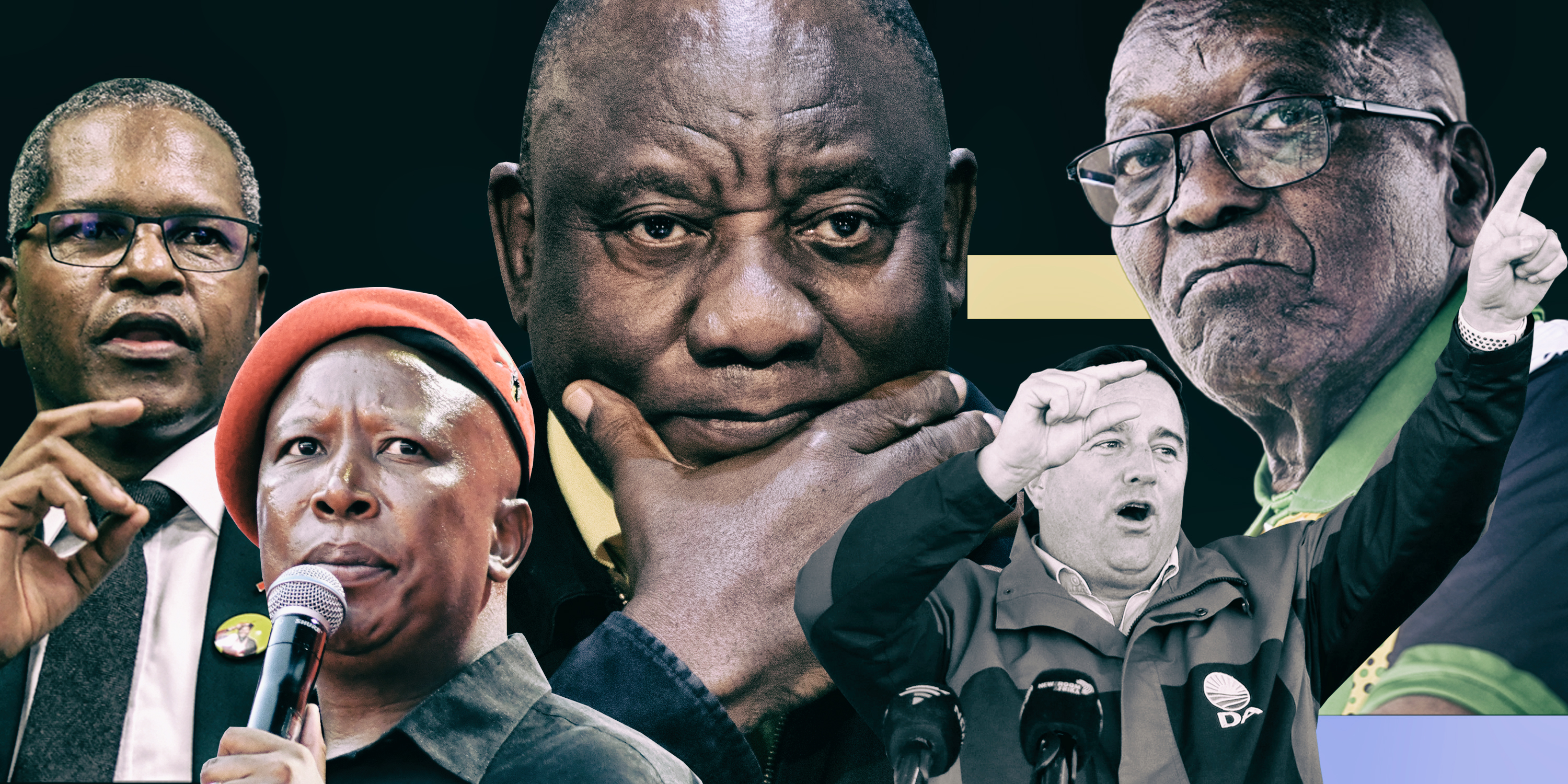Note: This piece of analysis relies on polling data made public. The accuracy, or the possible political leanings of those conducting the polls must always be considered when making decisions. Further Reading: Statistics Professor Mark Orkin or analyst Jonny Steinberg.
What a difference a few days can make. Just two weeks ago, many people were predicting that the ANC could fall to below 40% in the general elections and that it would have to choose between a coalition with the DA, or with the EFF. The news was dominated by former president Jacob Zuma’s uMkhonto Wesizwe party.
Now the trend may be turning.
As the ANC has started its campaign in earnest, and former presidents Thabo Mbeki and Kgalema Motlanthe have entered the fray, the polling indicates the ANC’s share of the vote is rising (Gareth van Onselen, no friend of the ANC, says that on current trends, the ANC could go above 50%).
At the same time, the more established opposition parties appear to be losing ground, while the newer parties may be losing their shine (the smaller the party, the harder it can be to poll for).
Soon, the strategists in every party will start to think about the longer term, a crucial task for the political players who are not focused exclusively on these elections.
For them, deciding who to team up with in a coalition must be compatible with a coherent longer-term strategy for 2029 and beyond.
Polling from Ipsos shows that while the ANC is just above 41%, the EFF is now at 11.5%.
If this were the final result, it would mean that while the ANC had lost significant support, the EFF had increased its share by less than one percentage point — revealing an inability to exploit exploding unhappiness with the government over its many failures, which include soaring youth unemployment.
The EFF has been the biggest electoral threat the ANC has ever faced. The governing party hasn’t ever had to worry about the DA winning more votes nationally, while the EFF has shown that it is prepared to campaign over the longer term, and Cope has collapsed. And MK is surely a one-election party (Zuma will be 87 in 2029).
The EFF has also caused damage to the ANC by targeting its leaders, first Jacob Zuma and now President Cyril Ramaphosa.
Read more in Daily Maverick: Elections 2024
Freezing the EFF
At the same time, the major source of the EFF’s influence is its role of kingmaker in councils.
If the ANC were determined to focus solely on the longer term, the best way to remove the EFF as a threat forever would be to simply keep it away from the machinery of power, regardless of the short-term cost.
Should the ruling party refuse to work with the EFF in any legislature, reject a coalition with it in the national government and cease working relationships with it in provinces and councils, Julius Malema would be reduced to the leader of an opposition party that had lost momentum.
Under that pressure, it would be difficult for him to keep the party going for another five years.
There is evidence that Malema understands this. In recent days, he has suggested that despite their obvious differences, he would be prepared to work with the DA.
Another benefit for the ANC of shutting out the EFF is that the DA would come under pressure.
Considering that DA leader John Steenhuisen has said several times over the years that he would be willing to work with the ANC, it should not be that hard for the ANC to convince him to follow through.
And, in the hard-nosed world of coalition negotiations, they would probably say he could tell his constituency he was only doing this to save them from the ANC’s only other option, what the DA calls the “doomsday coalition”.
But, in the longer term, working with the ANC would probably see the DA losing support ahead of 2029. (Something similar has happened before. In 2009, the FF+ deployed its leader, Pieter Mulder, to the position of deputy minister of agriculture, and the result was that his party lost support).
Of course, the ANC’s senior strategists could decide to go in the opposite direction.
They could conclude the DA will never be a long-term threat and that the way to neutralise the EFF is to force Malema to join a coalition with the ANC.
However, the EFF — like the DA — could be accused of “selling out” by working with the ANC. This would surely frustrate many of its voters who responded to its campaign for radical change.
Of course, it is not only the ANC making decisions — the EFF, the DA and other parties also have to think strategically about the longer term.
The DA appears to have been spending more time planning for the longer term than the other parties and could enter any post-election discussion with a clearer strategy.
But for Malema, if the results of this election do show he has lost momentum, he may have to grasp any possible coalition opportunity given to him — he would be forced to think only of the short term.
However, there is still some time before the elections. And the polling on which political parties are currently basing their strategies could be very wrong — which means they need to be flexible, right up until the final results are announced.
With more than three weeks to go, almost anything could happen. DM





